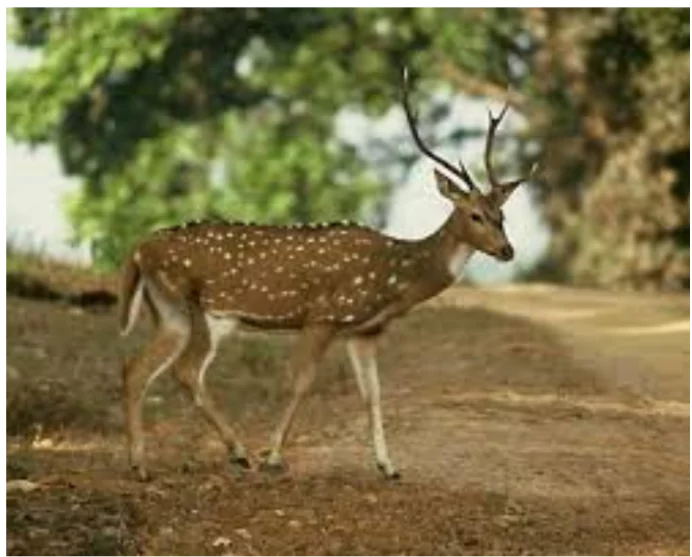Chital

|
- The Project Cheetah authorities have reached an in-principle decision to shift surplus cheetahs from Kuno national park to Gandhi Sagar wildlife sanctuary to save the chital Population.
Chital (Spotted Deer)
- Native Species: The chital, also known as the spotted deer, chital deer, and axis deer, is a deer species indigenous to the Indian subcontinent.
- Origins: Johann Christian Polycarp Erxleben
- Biological Features: It is sexually dimorphic; males are larger than females, and antlers are exclusively found on males.
- Population Estimation: According to the IUCN, the Axis deer is found throughout its range, although no overall population estimate is given.
- However, the IUCN Red List classifies the Axis deer as Least Concern (LC).
Kuno National Park:
- Location: Kuno National Park is situated in the Sheopur district of Madhya Pradesh, nestled near the Vindhyan Hills.
- Named after the Kuno River, a major tributary of the Chambal River, the park was originally established as a wildlife sanctuary before being designated a national park in 2018.
- It has been chosen as a site for the ‘Action Plan for Introduction of Cheetah in India’.
- Fauna: jungle cat, Indian leopard, sloth bear, Indian wolf, striped hyena, golden jackal, Bengal fox, and dhole.
- Flora: The forested areas of Kuno National Park are predominantly occupied by Kardhai, Salai, and Khair trees, constituting a mixed forest environment.
- The park boasts a diverse plant life, including 123 tree species, 71 shrub species, 32 exotic and climbing species, and 34 species of bamboo and grass.
|
Shyok river
|
- Recently, five soldiers died after a tank was swept away by strong water currents in the Shyok river during a military training in Ladakh
Shyok River:
- About: The Shyok River flows through northern Ladakh in Jammu and Kashmir, India, and into the Pakistan-administered region of Gilgit-Baltistan, where it merges with the Indus River.
- Tributary: As a tributary of the Indus River, it has a unique course. Its primary right-bank tributary is the Nubra River.
- Course: The river originates from the Rimo Glacier, one of the tongues of the Siachen Glacier, and its name derives from a Ladakhi word meaning ‘the river of death’.
- The alignment of the Shyok River is peculiar; it starts from the Rimo Glacier and flows southeast.
- Upon reaching the Pangong range, it abruptly turns northwest and flows parallel to its original course.
- The Shyok River flows through a broad valley, quickly narrowing into a gorge after Chalunka, before finally joining the Indus River at Skardu, Pakistan.
- Strategic Importance: The Shyok River valley holds strategic significance due to its access to several crucial passes in the Karakoram Range, notably the renowned Karakoram Pass.
|
Scholar Warriors
|
- Recently, Air Chief Marshal VR Chaudhari highlighted the old military concept of “scholar warriors” in his speech at an event.
Scholar Warriors:
- About: Scholar warrior is a military professional who combines intellectual acumen with combat prowess in today’s increasingly complex and dynamic security environment.
- Aim: It is aimed at creating well-rounded military practitioners who possess academic knowledge and statecraft alongside their core war-fighting skills.
- Military Training: Military professionals undergo military training and education at various levels and their courses are designed to meet this goal by incorporating tactical and strategic knowledge incrementally.
- Significance: The concept is being increasingly thought to be critical for shaping the next generation of military leadership, who will be as academically and conceptually strong in warfare strategies as they would be in an actual battle.
|
Discovery of prehistoric ostrich shells
|
- Archaeologists in Prakasam, Andhra Pradesh, discovered a 41,000-year-old ostrich nest. This find offers crucial insights into the extinction of megafauna in the Indian subcontinent.
Megafauna:
- About: The term is generally used to describe animals weighing more than 50 kg.
- Origins: The term was first used by the English naturalist and explorer Alfred Russel Wallace in his 1876 book, The Geographical Distribution of Animals.
- Classification: Megafauna may be classified based on their dietary type as megaherbivores (plant-eaters), megacarnivores (meat-eaters), and megaomnivores (who eat both plants and meat).
- Ostriches are megaomnivores, with an adult ostrich weighing anywhere between 90 and 140 kg, with height between seven and nine feet.
- Significance: The discovery in Andhra proves the presence of ostriches in southern India 41,000 years ago. It also adds to the growing body of research examining why megafauna went extinct in India.
|
IMAX
|
- IMAX is one of the most popular film formats employed in commercial filmmaking in cinema today.
IMAX:
- About: IMAX is a motion picture film format. It consists of a production pipeline of high-resolution cameras, film formats, projectors, and theatres.
- Origins: Developed in Canada in the 1970s, IMAX seeks to give the viewer an immersive movie-watching experience with its large screens.
- High Resolution: The IMAX film format provides an extremely high resolution vis-à-vis its 35mm counterpart.
|
National Test House
|
- Recently, the Centre plans to make National Test House as apex certification body for all Indian products.
National Test House:
- About: NTH was established in 1912 as the “Government Test House” in Alipore, Calcutta. National Test House (NTH) is a leading scientific organisation dedicated to testing, calibration, and quality evaluation of raw materials and finished products for over 109 years.
- Nodal Ministry: NTH operates as a subordinate office under the Department of Consumer Affairs, Ministry of Consumer Affairs, Food & Public Distribution.
- Key Objective: To support and advise domestic manufacturers on engineering goods production through quality testing.
|
Road Cave-ins

|
Recently the newly built Ram Path in Ayodhya suffered road cave-ins at multiple spots.
What causes a portion of the road to cave in?
- The cave-ins or cavities that look like a hole in the ground are actually a product of the incessant rain.
- Continuous rain leads to overflowing of drains, which can cause leaks in the pipeline.
- Water from the pipeline flows into the layers of earth around it, the earth starts to erode and with time, it gets washed away with the water in the pipeline.
- Eventually, the portion of the road over it collapses because of the erosion.
|
![]() 2 Jul 2024
2 Jul 2024